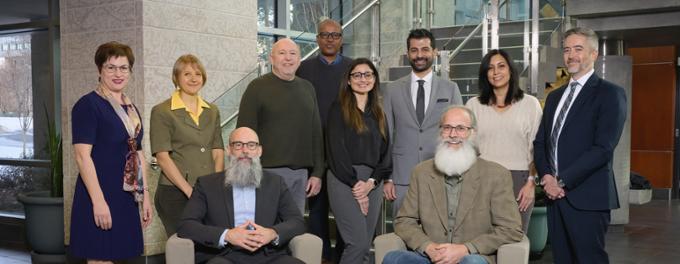
Department of Economics
What is Economics?
Economics is a social science that studies how individuals, businesses, governments and nations make choices when faced with scarcity to advance their economic wellbeing. Each society must decide what goods and services to produce, which methods to use to produce those goods and services, and to whom to distribute these goods and services once they are produced. Economics considers rational, self-interested economic agents to explain economic behaviour, while behavioural economics incorporates insights from human psychology to explain economic behaviour. Economics is a way of thinking that equips you with essential tools to make sound decisions in business, government and everyday life.
The Department offers a BA major and Honours major in Economics; a major in Economics and Society; a combined major in Economics and Business Administration; a combined major in Economics and History; a combined major in Philosophy, Politics and Economics; a BSc major and BSc Honours major in Economics; and a BSc combined major in Statistics and Economics. The Department also offers numerous Economics Certificates and a minor in Economics.
Why Study Economics?
An economics degree is a sound career investment
Careers in Economics consistently rank as one of the highest for lifetime earnings. As an economist, you are able to compete for a variety of high-paying careers in the public, private and not-for-profit sectors in a variety of roles such as economic policy analyst, research analyst, economic development specialist, financial analyst, management, a pre-law etc.
Jobs available to trained economists in public sector include areas of statistical analysis (Statistics Canada), monetary policy (the Bank of Canada), public finance (advising municipal, provincial and federal governments on taxing and spending), economic development (advising towns and provinces on the best ways to attract business investment or plan for future expansion), and policy analysis (government departments and prestigious international institutions like the IMF, the World Bank and the United Nations). In the private sector, trained economists can work as foreign-exchange traders, stockbrokers, financial consultants, auditors, tax analysts, investment advisors, research officers, bank managers, market analysts, labour-relations managers, journalists, and so on. An economics degree may also open the door to professional programs in Business Administration, Law, Public Administration and Accountancy.
Develop transferrable skills
As you learn economics you develop analytical reasoning, problem solving, critical thinking, data analysis and financial literacy, all valuable skills needed in today’s workplace. Like a Swiss Army knife that contains many tools you can use to complete different tasks, an Economics degree equips you with important skills to succeed in your career.
Why choose Economics at the University of Regina?
We take an economics in action approach. Our programs have a strong focus on applications in real world. Along with foundational courses, we offer many engaging and interesting courses that examine important issues of today and tomorrow.
You learn from Economics faculty members who bring passion, energy and dedication to your education. They are approachable, care deeply about students and provide support for your success.
You learn from faculty members who are doing research with impact in the world in areas like environment and energy, health economics, crime and public safety, agricultural research policy, economic development of Indigenous communities, cannabis markets and more.
Take advantage of a number of Economics scholarships, awards, and paid research opportunities offered by the Department of Economics. As an Honours student, you can pursue a summer Research Fellowship and work closely with a faculty member.
Apply what you learn in class to the real world. Economics training provides great opportunities for cooperative education placements in public, private and not-for-profit sectors.
Contact Us
Department of Economics
University of Regina
Classroom Building 211
3737 Wascana Parkway
Regina SK S4S 0A2
Phone: 306-585-4485
Email: Economics.Dept@uregina.ca
Department Head
The department’s commitment to academic excellence and its supportive faculty shaped my wonderful experience with Economics. The Honours Program equipped me with skills and research capabilities invaluable in today’s competitive landscape. The personalized attention and mentorship I received from Econ professors nurtured an environment that allowed me to pursue my passions. I am grateful and I would recommend Economics to prospective students seeking a well-rounded, personalized, and impactful academic experience.
Recent Publications
Taking the Economics program has been a wonderful journey. The best part of my journey was having my professors personally invested in supporting my success. The department offers some fantastic courses, which prepare you well for your career.
Economics Tutorial Centre
The Department of Economics is pleased to offer our Tutorial Centre for assistance with ECON 100, 201, 202, and 224 courses. Please see the schedule below for specific dates and times.
Note: ECON 100, 201, 202, and 224 will take precedence. If you require assistance with other ECON courses, please notify the Teaching Assistant. In order to serve you better, please have any relevant course materials (ie: assignment/textbook) readily available.
The schedule for the Winter Economics Tutorial Centre is as follows:
Mondays & Wednesdays - January 6th - April 13th (excluding holidays): 8:30 - 11:00 a.m. In person/online
Online Tutoring is available through Teams using this link
Economics Honours Research Fellowship
The Economics Honours Research Fellowship seeks to provide students who are pursuing a degree in the Faculty of Arts or the Faculty of Science, majoring in BA honours in Economics or BSc Honours in Economics with a paid work-term/research project. The fellowships will be presented to University of Regina undergraduate students who meet the following criteria:
- Enrolled in the Faculty of Arts or Faculty of Science;
- Pursuing a Bachelor of Arts (Honours) with a major in Economics or a Bachelor of Science (Honours) with a major in Economics;
- Have a minimum Program Grade Point Average (PGPA) of 80%
- Successfully completed a minimum of 75 credit hours
- Registered and remain registered in a minimum of 9 credit hours in the Winter term prior to completing the fellowship.
- Will be entering their final year of studies in the fall semester after completing their research project; and
- Have arranged for faculty members with demonstrated research excellence in the areas of their research projects to supervise the work
- Does not hold another research grant/award to support the same work
- Commit to presenting their research findings at an Economics seminar
Applicants must complete an application form, and a two-page written proposal and rationale outlining the research project they plan to undertake. A letter of recommendation and a brief description of the research the student will undertake must also be supplied by the proposed supervisor.
For further information or questions about the application process, please contact the Department of Economics Undergraduate Coordinator: viktoriya.galushko@uregina.caMy time in the Economics program was thoroughly enjoyable, and provided me with many valuable skills I use daily to help me succeed in my current studies as a Master of Financial Economics Candidate at Western University.
Economics Student Association


The Economics Student Association (ESA) aims to represent all Economics majors at the University of Regina, and aims to enhance their university experience by providing support for academic and career-related success.
Transitioning to university isn’t always easy. The Economics Student Association offers its Economics Mentorship Program to help you get the most out of your academic journey.
2023/24 Executives
President - Ethan Ernst
Executive Vice President - Michael Stevenson
VP Finance - Adam Neibergall
VP Media - Marina Sandragaylo
VP Events - Milto Mekonen
VP Outreach - Lisa Okudi
Resources
- Philosophy, Politics, and Economics
- Scholarships and Awards Application System (SAMS)
- Undergraduate Calendar
- Guidelines for Economics Core Courses (PDF)
- Suggested Academic Plan for Economics Majors (PDF)
- Suggested Academic Plan for Economics Co-op (PDF)
- Suggested Academic Plan for Economics Honours Majors (PDF)
- Suggested Academic Plan for Economics Majors (Early Adopters) (PDF)
Canadian Government Agencies
Associations and Research Institutes
- C.D. Howe Institute
- Fraser Institute
- Economic Policy Institute
- Institute for Research on Public Policy
- Caledon Institute of Social Policy
- Canadian Tax Foundation
- Canadian Economics Association (CEA)
- American Economics Association
- Canadian Association for Business Economics (CABE)
- World Bank
- International Monetary Fund
- Organization for Economic Co-operation and Development
- International Labour Organization
- Inter-American Development Bank
- Asian Development Bank
- St. Louis Federal Reserve Bank's FRED data site
- U.S. Department of Labor's Bureau of Labor Statistics
- Penn World Table
- U.S. Central Intelligence Agency Publications

